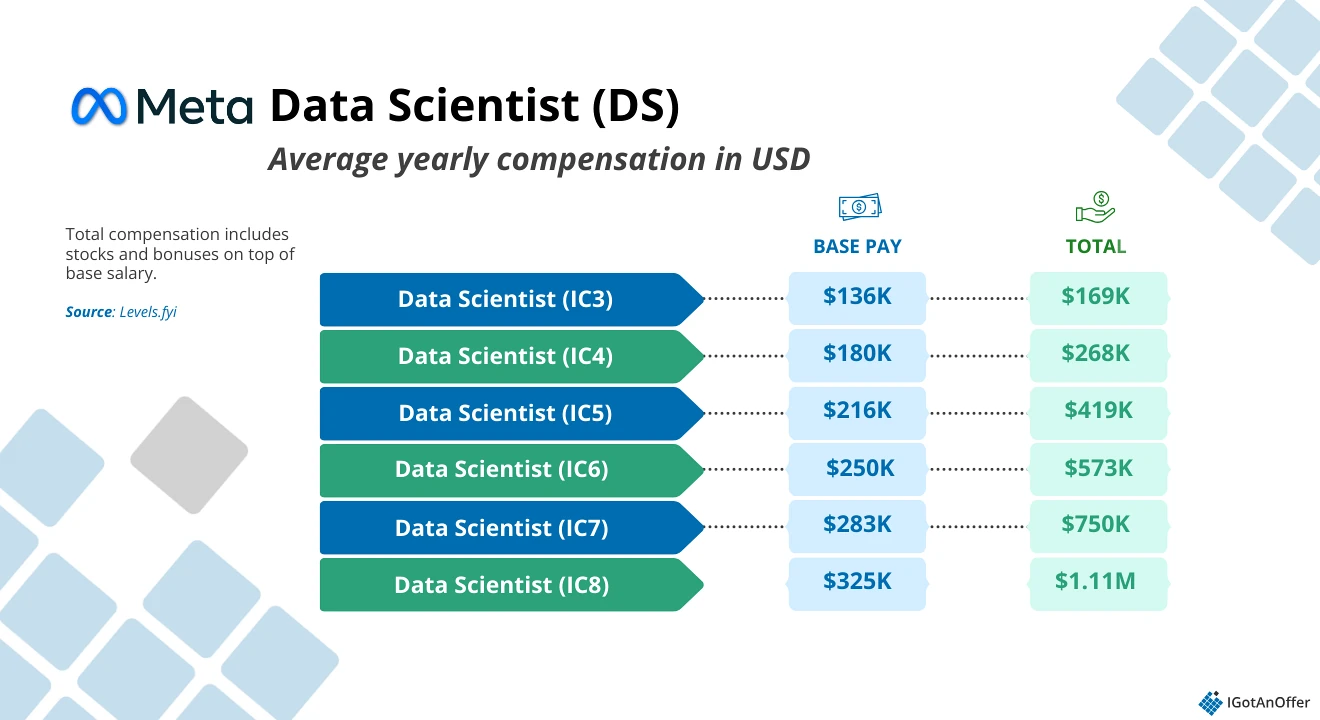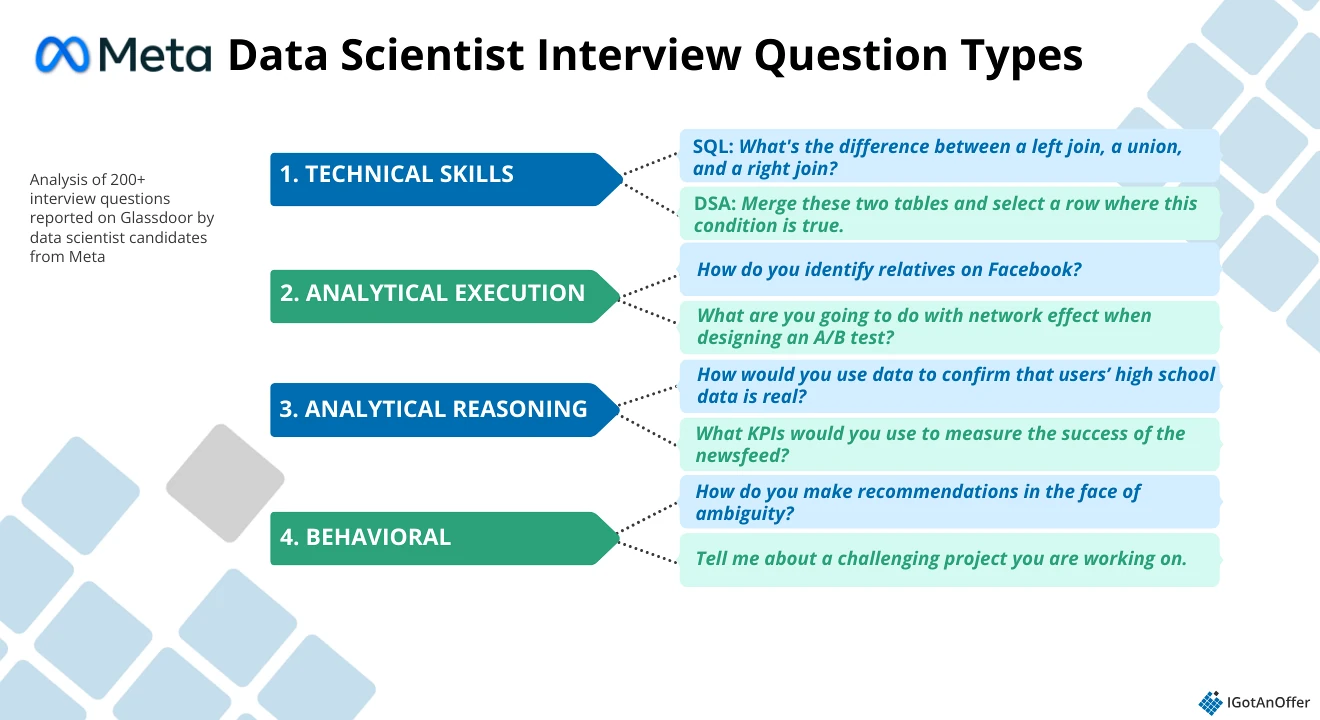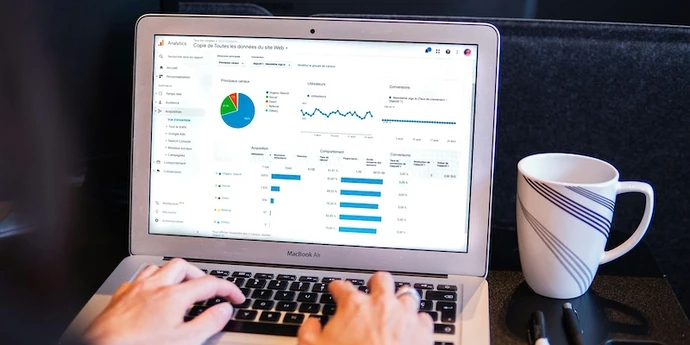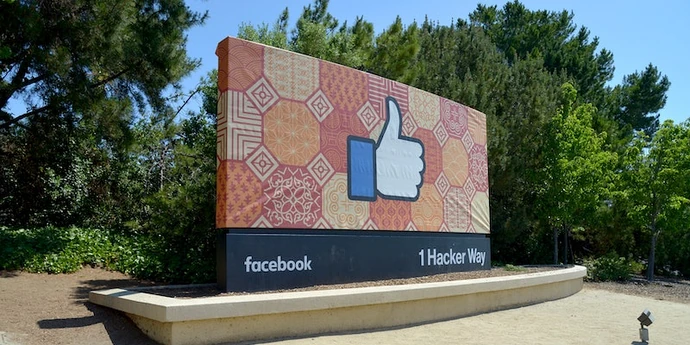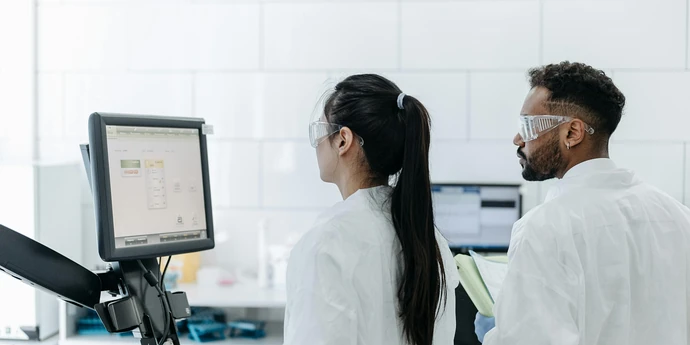Data scientist interviews at Meta are tough to crack. The interview process is rigorous, with challenging, company-specific questions across four or more rounds.
What kinds of questions can you expect? For starters, you’ll be tested on your technical skills and foundational knowledge of product metrics and statistics. You’ll also face behavioral questions designed to assess your motivation, collaboration style, and culture fit.
The good news? With the right preparation, you can significantly improve your chances of landing that data scientist role at Meta.
That’s why we created this comprehensive guide. We spoke with former Meta data scientists and reviewed real candidate experiences from Glassdoor, along with insights from official Meta resources.
This guide focuses on the Data Scientist, Product Analytics role, Meta’s most common data science position, though much of the advice also applies to other data science roles at the company
Below, you’ll find a detailed breakdown of the interview process, some sample questions, and expert tips—everything you need to walk into each round with confidence.
Here's an overview of what we'll cover:
Click here to practice 1-on-1 with data science ex-interviewers
Let's get started!
1. Meta data scientist (product analytics) role and salary↑
Before we cover your Meta data scientist, product analytics interviews, let’s first look at the role itself.
1.1 What does a Meta data scientist do?
As a data scientist at Meta, your ultimate goal is to provide data-driven insights that will help improve user experience across Meta’s products.
A big part of your role is designing robust and informative experiments with engineers, organizing and analyzing large datasets, and visualizing them for a larger audience. You’re also in charge of coming up with the proper metrics to measure your team’s progress and success, in collaboration with the product team.
As a Meta data scientist, you’ll be part of what is known as a Meta Pod. This team consists of software engineers, designers, product managers, data engineers, data analysts, and other functions depending on the product or service.
1.2 Are all data scientist roles at Meta focused on product analytics?
Not entirely. The Meta data scientist role is largely a product analytics role, where you’ll work with product teams to run experiments, analyze data, and help drive strategy.
But there are some exceptions. Coach Yahia (ex-Meta Sr. Research Data Scientist) says though uncommon, there are "some data scientists, especially in ads, who end up doing non-product analytics roles."
He adds that there are also specialized tracks, such as Core Data Science, which is more focused on developing novel methods and conducting research that applies across Meta. It’s less tied to a specific product, but these methods often get adopted by product teams later on.
Some candidate reports on Reddit also suggest that Meta teams, such as Data Infrastructure, Sales/Go-To-Market, and Ads Ranking Infra, lean more toward business analytics. These teams focus less on experimentation and more on building metrics, extracting insights, and shaping strategy with data.
Interestingly, Coach Yahia pointed out that most candidates interviewing for Meta data science roles aren’t specifically seeking “Product Analytics” positions.
“A lot of people take the position despite the ‘product analytics’ element, but then grow within it as it has so many more things to offer.” This often means greater influence, building strong data narratives, and opportunities to guide multiple teams with insights.
Still, if you’re heading into a Meta product data scientist interview, it’s safest to assume the focus will be on product analytics skills unless the posting specifies otherwise.
So, expect to be tested on statistical knowledge, A/B testing, and your ability to frame insights in a way that drives product decisions.
1.3 Meta data scientist (product analytics) vs. Meta product analyst vs. Meta data analyst
These data roles at Meta often get blurred together. From our analysis of Meta job postings and input from Coach Yahia (ex-Meta Sr. Research Data Scientist), the main differences come down to expectations in statistics, the teams you work with, and compensation.
Meta Data Scientist (Product Analytics) roles are the most stats-heavy of the three roles and work closely with product teams and engineers. However, unlike TikTok data scientist roles, which are more applied-ML-driven and often involve building or optimizing models, Meta DS focuses more on guiding product decisions rather than directly building a software product.
So, if you prefer roles that are more geared toward building products at Meta, look for titles such as Research Scientist, Machine Learning Engineer, or Measurement Lead.
Meta Data Analysts usually work with business teams. Their role is less about experimentation and more about generating quick insights, building dashboards, and presenting findings in a way that helps teams make faster decisions.
Lastly, Meta Product Analysts focus on supporting product strategy, but the exact scope depends heavily on the team you join. For example:
- Product Growth Analysts analyze user behavior and run experiments to influence growth strategy.
- Product Analysts (Quality and Experience) define metrics and testing strategies to improve product quality.
- Product Lifecycle Management Analysts support new product introductions and mass production, working closely with suppliers and cross-functional teams.
Right, now that we cleared that up let's move on to compensation.
1.4 How much does a Meta data scientist make?
Based on Glassdoor data, the average total pay for a Meta data scientist is $277k/year, which is 45% higher than the estimated average total for a data scientist in the US at $152k/year.
Below you can see the average salary and compensation of the different data scientist levels at Meta US, as of early 2026, based on Levels.fyi.
We presume that you already know which level you’re applying for, but it’s still good to double-check with your recruiter. They should be able to advise you on which level you’re being evaluated.
Ultimately, how you do in your interviews will help determine your offer. That’s why hiring one of our ex-Meta interview coaches can provide such a significant return on investment.
And remember, compensation packages are always negotiable, even at Meta. So, if you do get an offer, don’t be afraid to ask for more.
If you need help negotiating, read our Meta salary negotiation guide for tips and consider booking one of our salary negotiation coaches to get expert advice.
2. Meta data scientist interview process and timeline↑
2.1 What steps to expect
What's the Meta interview process and timeline for the data scientist role? It typically takes 4 to 8 weeks and follows these steps:
- Resume screen
- Recruiter screen
- Initial screen (~45 minutes)
- Full loop round (4 interviews, 45 minutes each)
Let's look at each of these steps in more detail below:
2.1.1 Resume screen
First, recruiters will look at your resume and assess if your experience matches the open position. This is the most competitive step in the process, as millions of candidates do not make it past this stage.
To stand out, you’ll need to have an outstanding resume. Take a look at real Meta resume examples and data science resume guide to see which kinds of resumes get noticed. Then write or polish your existing one with tips from our tech resume guide.
If you’re looking for expert feedback on your resume, you can get input from our team of ex-Meta recruiters, who will cover what achievements to focus on (or ignore), how to fine-tune your bullet points, and more.
Getting an employee referral might also help. According to Glassdoor, 25% of candidates who got interviews with Meta had employee referrals.
So, if you know someone who works at Meta, this could help you get your foot in the door. Just know that a referral won’t guarantee you the role; it will simply help your resume get noticed.
2.1.2 Recruiter screen
In most cases, you'll start your interview process with Meta by talking to an HR recruiter on the phone. They are looking to confirm that you've got a chance of getting the job at all, so be prepared to explain your background and why you’re a good fit at Meta.
You should expect typical behavioral and resume questions like, "Tell me about yourself," "Why do you want to work at Meta?", or "Tell me about your current day-to-day."
If you get past this first HR screen, the recruiter will then help schedule an initial interview with a peer or hiring manager.
One great thing about Meta is that they are very transparent about their recruiting process. Expect your HR contact to walk you through the remaining steps in the hiring process and share with you a helpful email listing resources you can use to prepare.
2.1.3 Initial screen
The next step is a very focused 45-minute initial phone screen with a peer or a hiring manager.
According to candidate reports on Glassdoor, the phone screen is typically divided into three parts: SQL, product case scenario setting, and building experiments based on the product case scenario.
Based on the Meta initial screen guide for data scientists, you’ll be assessed on the following four areas:
- Programming: assessing your complex data problem-solving skills using programming and scripting languages.
- Research design: assessing your scientific design testing skills, with a focus on your ability to design appropriately for particular strategic business questions.
- Determining goals and success metrics: assessing your ability to identify appropriate metrics for a particular business objective.
- Data analysis: testing your practical data analysis knowledge, and your ability to leverage the right methodology to answer exploratory and hypothesis-based questions and inform decisions.
We highly recommend checking out the Meta initial screen guide for data scientists for a more detailed look into this interview stage.
If you manage to clear this screen, your recruiter will then schedule you for the final full loop round.
2.1.4 Full loop round
The final stage in the interview process is a full loop interview conducted virtually through video conferencing.
As outlined in Meta's full loop guide, this typically includes 4 interviews, each lasting 45 minutes and focusing on a particular skill:
- Technical skills. This is a coding round where you’ll be presented with an open-ended product problem, testing your skills in programming, communication, data analysis, and determining metrics.
- Analytical execution. This interview will assess your ability to create hypotheses for launching new products and determining success metrics, your quantitative analysis knowledge, and your agility.
- Analytical reasoning. This interview will assess your research design, analytical design, data visualization, and storytelling through data.
- Behavioral. This will assess your alignment with Meta’s culture and values.
We’ll cover each interview round below in more detail.
For your technical skills interview, you'll need to work through your solutions on a whiteboard or the online equivalent if you're not there in person.
Meta typically uses CoderPad, but best to confirm with your recruiter which tool your interviewer will be using. Be sure to practice with the tool before your interview.
One thing you’ll need to get used to is coding on a tool without execution ability, according to Audrey, ex-Meta data science manager. "You'll need to make sure your syntax is correct on your own."
2.2 What happens behind the scenes
Throughout the interview process at Meta, the recruiter usually plays the role of "facilitator" and moves the process from one stage to the next. Here's an overview of what typically happens behind the scenes:
- After the initial screen, the interviewer(s) you've talked to submit their ratings and notes to the internal system. Your recruiter then reviews the feedback and decides to move you to the onsite interviews or not, depending on how well you've done.
- After the Full Loop, the interviewers will make a recommendation on hiring you or not, and the recruiter compiles your "packet" (interview feedback, resume, referrals, etc.). If they think you can get the job, they will present your case at the next candidate review meeting.
- Candidate review meetings are used to assess all candidates who have recently finished their Full Loops and are close to getting an offer. Your packet will be analyzed, and possible concerns will be discussed. Your interviewers are invited to join your candidate review meeting but will usually only attend if there's a strong disagreement in the grades you received (e.g., 2 no-hires, 3 hires). At the end of the candidate review meeting, a hire/no-hire recommendation is made for consideration by the hiring committee.
- The hiring committee includes senior leaders from across Meta. This step is usually a formality, and the committee follows the recommendation of the candidate review meeting. The main focus is on fine-tuning the exact level and therefore the compensation you will be offered.
It's also important to note that hiring managers and people who refer often have little influence on the overall process. They might help you get an interview at the beginning, but that's about it (though we do know of exceptions to this rule).
3. Meta data scientist example questions↑
Now that we've covered the process, let's get into the kinds of questions you can expect for each type of interview.
We've gathered real Meta data scientist interview questions, as reported by real candidates on Glassdoor. We’ve divided them based on the categories in Meta's official full loop guide for the role.
Many of the questions below are asked in the form of case studies. To learn more, read our guide on data science case study interviews.
Please note: If you're applying for a Data science leadership/management role, your onsite interviews will be much more focused on testing your leadership ability in different contexts. Download this Meta guide to the data science leadership onsite.
Let’s get into the example questions.
3.1 Technical analysis questions↑
Meta data scientists work with some of the strongest data sets in the world. Therefore, you’ll be expected to have top-notch coding and data problem-solving skills.
Most of the technical skills questions are designed with SQL in mind, but you won’t be assessed on your SQL fluency per se (unless it is specified in the job description). What you’ll be tested on is your ability to structure, articulate, and code an executable solution to the problem you’ll be given.
You’ll also be assessed on your ability to identify and address edge cases, adaptability to new information/constraints, and code efficiency.
Feel free to code in the language you’re most familiar with. Just make sure to inform your recruiter of your preference beforehand.
In addition to SQL (or equivalent) questions, expect questions related to data structures and algorithms (DSA). These questions are less frequently asked since data scientists tend to have fewer engineering responsibilities at Meta, but it’s good to be prepared.
Meta data scientist interview question examples: Technical analysis
SQL
- Provided a table with user_id and the dates they visited the platform, find the top 100 users with the longest continuous streak of visiting the platform as of yesterday. (Solution)
- Provided a table with page_id, event timestamp, and an on/off status flag, find the number of pages that are currently on.
- Given a database of posts and a database of comments on those posts, how do you determine how many conversations are happening in the comments per post on average? (Solution)
- You're given two tables. One contains the date, post_id, relationship (e.g., friend, group, page), and interaction (e.g., like, share, etc.). The second table contains post_id and the ID of the person who posted. How many likes were made on friend posts yesterday?
- What's the difference between a left join, a union, and a right join?
- Using SQL, how would you provide a distribution of rolling 7-day average money spent per person, broken up into categories of purchase? (Solution)
- In SQL, how do you combine two datasets while keeping all the information? (Solution)
- How can you pull the unique conversation events from a database in SQL? (Solution)
- How do I create a validation tool for Facebook Marketplace?
- Deep dive into a specific project using SQL, Python, and statistics.
- Using SQL, calculate the daily revenue generated in the US for this product over the past 30 days. (Solution)
- Using SQL, calculate the total number of sessions for each app in the VR headset.
Data structure and algorithms
- There is an algorithm that rates posts based on their likelihood of being spam. How would you check if the algorithm works?
- Given a list, search for consecutive numbers (n) whose sum is equal to a specific number (x). (Solution)
- Given a list of people with things that they own, find the people who have common items and what they are.
- How do you revert a string?
- Merge these two tables and select a row where this condition is true. (Solution)
Check out our coding interview questions list (with samples for Python, Java, C++, SQL, and more) and our Meta coding interview guide to learn more.
3.2 Analytical execution↑
The analytical execution interview is meant to evaluate your hypothesis-creation skills and grasp of core statistical concepts.
According to Enming (ex-Meta research scientist), analytical execution is essentially about product sense. “Keywords to focus on are metric design, metric measurement, A/B tests, and providing insights and suggestions to the team.”
To prepare, brush up on your statistics fundamentals (Law of Large Numbers, Central Limit Theorem, Linear Regression, Bayes' Theorem) and practice giving concise explanations of statistical terms (e.g., p-value, recall, etc.).
It's pretty common to get A/B testing-related questions for this round. So, if you have experience conducting A/B tests, we'd recommend preparing a specific example in advance.
Audrey says that many candidates confuse analytical execution and analytical reasoning questions (to be discussed below).
"The easiest way to think of it is that execution questions emphasize quantitative analysis and sometimes can be solved with a machine learning approach," she says.
Let's take a look at some questions.
Meta data scientist interview question examples: Analytical execution
- How do you identify relatives on Facebook?
- How would you estimate how much fake news is on Facebook? How would you estimate its impact?
- How would you find all of the songs played by a user
- What are you going to do with network effect when designing AB test?
- What would you do about the problem of "fake" friend requests
- How would you account for network effects when testing a new feature?
- When would you use a t-test versus a z-test?
- How would you detect bot activity in Messenger chat logs?
- An A/B test shows a 0.2% drop in CTR but an increase in session length. How would you interpret these results, and what would you do next?
- Define precision and recall in a tweet-length explanation
3.3 Analytical reasoning↑
For the analytical reasoning interview, you’ll be evaluated on your ability to structure ambiguous product questions, identify the best data sets for them, and design experiments to test your hypotheses.
You’ll also be assessed on your understanding of certain methodologies' downsides and biases, and how you plan to handle them.
Lastly, you’ll be evaluated on your data storytelling and visualization skills.
Let's take a look at some example questions.
Meta data scientist interview question examples: Analytical reasoning
- How can you find out the xxx feature on the platform? What data would you look at?
- How would you do an A/B test on your new metric to see if it truly captures meaningful social interactions better?
- Explain your process for doing A/B testing.
- How would you use data to confirm that users’ high school data is real?
- How would you evaluate the impact for teenagers when their parents join Facebook?
- How would you decide to launch or not if engagement within a specific cohort decreased while all the rest increased?
- How would you set up an experiment to understand feature change in Instagram stories?
- How would you determine the health of Facebook Groups?
- How would you determine if a new system that identified and banned accounts that were posting ads for prohibited content was working?
- Your product manager is launching a new feature to improve engagement on the newsfeed; how would you guide her on whether the overall impact is positive? How would you recommend setting up an experiment?
- How would you measure the success of a product?
- What KPIs would you use to measure the success of the newsfeed?
- How would you improve notifications?
- How will you separate “high-quality” notifications from all notifications?
- Activity in Facebook user groups is down by 20%; what do you do?
- Friends acceptance rate decreases by 15% after a new notification system is launched—how would you investigate?
- The notification product will launch a new feature. The feature is a new type of notification. When your friends attend an event, you will get a notification. How do you measure the success of this new feature?
- Imagine a product similar to Facebook Marketplace called Facebook Restaurants. Measure the success of this new feature.
- How would you measure the success of a newly released feature that is similar to the Facebook group chat?
- How will you gauge the success of the new notification feature in Groups? Provide guardrail metrics.
- Should we launch a new notification feature? if we launch, how do we evaluate the performance?
- How would you build a “restaurants you may like” recommender system on the news feed?
- How would you predict churn rate?
- Given a table of data, how would you create a model to detect spam?
- How would you create a model to find bad sellers on Facebook Marketplace? How can you tell if your model is working?
- You see "average reels watched" has dropped precipitously suddenly, how would you figure out what's happening?
- Given a case study about a new group call feature Facebook is developing, how do you test if that would be a success?
- How would you increase engagement in FB groups comments
- Let's say we're thinking of doubling ads on Instagram. What do you think?
- How would you determine whether we should introduce a group video feature in one of our messaging apps?
- How would you measure the overall health of a Facebook Page?
- How would you measure the prevalence of policy-violating content on the platform?
- Do you think “view prevalence” is a good metric for this? What are the trade-offs?
3.4 Behavioral questions↑
Lastly, you can expect behavioral and resume questions to assess your motivational and culture fit.
According to the Meta’s official full loop interview guide, to ace this interview, prepare answers that show how you:
- Operate in ambiguous projects and situations
- Move quickly and resourcefully
- Can be open about your failures and learn from them
- Build relationships and collaborate with your direct and partnering teams to achieve mutual objectives
- Influence and get buy-in from peers resistant to your goals
- Exhibit introspection and self-awareness
To prepare for this section, start by reviewing Meta’s mission statement and core values.
Let’s look at some questions.
Meta data scientist example interview questions: Behavioral
- Why Meta?
- Why data science?
- Describe a data and analytics project you've worked on.
- Tell us about your past experience, skills, and interests.
- What is your biggest weakness?
- Tell me about a time when you had to influence a stakeholder on a decision they don’t necessarily agree with.
- Tell me about some work you are proud of.
- How would you handle ambiguity? How do you make recommendations in the face of ambiguity?
- What do you like about your work? What do you dislike?
- Tell me about something challenging you are working on.
- Give an example of how you used your skill to gain insight into a difficult problem.
- Tell me about the best thing you learned in any of your previous projects.
- Talk through the challenges that are involved with bringing a solution to production.
Check out our guide to Meta behavioral interviews to learn more.
4. Meta data scientist interviewing tips ↑
You might be a fantastic data scientist, but unfortunately, that won’t necessarily be enough to ace your interviews at Meta. Interviewing is a skill in itself that you need to learn.
Let’s look at some key tips to make sure you approach your interviews in the right way.
4.1 Ask clarifying questions
Often, the questions you’ll get will be quite ambiguous. Make sure you ask questions that can help you clarify and understand the problem.
Be upfront if you encounter topics you have little experience with, but don’t give up on tackling them. Meta isn’t just testing your technical skills but your ability to deal with problems you’re not familiar with.
4.2 Treat the interview like a conversation
Meta wants to know if you have excellent communication skills. So make sure you approach the interview like a conversation.
Meta will also be testing you on your ability to tell a clear and concise story through data, especially to stakeholders who may or may not have a technical background.
Be sure to practice communicating data in a way that’s clear and easy for everyone to understand.
4.3 Think out loud
You need to walk your interviewer through your thought process before you actually start coding. Meta recommends that you talk even while coding, as they want to know how you think.
Your interviewer may also give you hints about whether you’re on the right track or not. Be alert for these, and be ready to pivot once you’ve gotten the prompt. This shows you’re eager to learn and listen well to feedback.
4.4 State and check assumptions
You need to state assumptions explicitly, explain why you’re making them, and check with your interviewer to see if those assumptions are reasonable.
4.5 Present multiple possible solutions
Present multiple possible solutions if you can. Meta wants to know your reasoning for choosing a certain solution.
When dealing with complicated or ambiguous questions, show your ability to deconstruct such problems into groups and demonstrate how you can combine these groups for your proposed solution.
4.6 Center on Meta’s culture
Familiarize yourself with Meta’s core values and align your responses with them.
For the data scientist role in particular, Meta wants to see certain attributes such as comfort with ambiguity, agility, a collaborative nature, and a sense of urgency.
Note that your culture alignment will be assessed during the entire interview process and not just in your behavioral interview. For example, your agility (or ability to adapt to new information) will be evaluated in your technical interviews.
5. Preparation plan↑
Now that you know what questions to expect, let's focus on how to prepare. Below is our four-step prep plan for Meta.
If you're preparing for other companies as well, then check out our general data science interview preparation guide.
5.1 Learn about Meta's culture
Most candidates fail to do this. But before investing a ton of time preparing for an interview at Meta, you should make sure it's actually the right company for you.
Meta is prestigious, and so it's tempting to assume that you should apply without considering things more carefully. But it's important to remember that the prestige of a job by itself won't make you happy in your day-to-day work. It's the type of work and the people you work with that will.
If you know anyone who works at Meta (or used to), it's a good idea to talk to them to understand what the culture is like.
Meta recommends checking out these resources to help you learn more about the company:
- Meta’s mission statement and 6 core values
- Meta Newsroom
- Meta Life
- How to get users and grow (by Alex Schultz, VP of Growth at Meta)
- How Facebook Used Science And Empathy To Reach Two Billion Users (by FastCompany)
In addition, we recommend reading the following:
- Facebook's hacker culture (by Mark Zuckerberg, via Wired)
- Meta annual reports and strategy presentations (by Meta)
- Meta's approach to tech trends (by CB Insights)
- Meta org culture analysis (by Panmore Institute)
5.2 Practice by yourself
As mentioned above, you'll encounter four main types of questions at Meta: technical skills, analytical execution, analytical reasoning, and behavioral.
For the analytical execution and analytical reasoning interviews, below are some resources recommended by Meta, a few of our own recommendations, and our interview guides:
- How Experimentation Informs Product Development: LinkedIn
- Ultimate A/B Testing Guide
- Khan Academy Statistics & Probability Course
- Cracking the PM Interview by Gayle Laakmann McDowell
- Brilliant.org (courses on core statistical fundamentals)
- StackExchange Stats page (for specific questions and answers around statistics, machine learning, data analysis, and others)
- How to crack product improvement questions
- How to crack metric questions
- How to crack data science case studies
Our product improvement and metric guides were written for product managers, but you should find a lot of the content pretty helpful.
For the technical skills questions, here are some resources we found useful and others recommended by Meta:
- Practice for 3 types of SQL interviews
- SQL Course
- Mode Analytics SQL Tutorials
- Programmer Interview SQL Practice Database
- Python | SQL Comparison
- Data Transformations in R
For behavioral questions, we recommend reading our guide to Meta behavioral interview questions. There you’ll find a step-by-step method for answering, and even more example questions to practice with.
We also have an article on what a real Meta interview experience is like, with success stories from people we've worked with. Check that out to get some prep best practices from successful candidates.
Once you’re in command of the subject matter, you’ll want to practice answering questions. But by yourself, you can’t simulate thinking on your feet or the pressure of performing in front of a stranger. Plus, there are no unexpected follow-up questions and no feedback.
That’s why many candidates try to practice with friends or peers.
Practicing for a data science role at another company? Check out our other company-specific guides:
- Uber data scientist interview
- Google data scientist interview guide
- Amazon data scientist interview guide
- Amazon applied scientist interview guide
- TikTok data scientist interview guide
5.3 Practice with peers
Practicing by yourself will only take you so far. One of the main challenges of data scientist interviews at Meta is communicating your different answers in a way that's easy to understand.
As a result, we strongly recommend practicing with a peer or a friend. Even better if you can find someone with the same background or has interviewing experience.
However, be warned, as you may come up against the following problems:
- It’s hard to know if the feedback you get is accurate.
- They’re unlikely to have insider knowledge of interviews at your target company.
- On peer platforms, people often waste your time by not showing up.
For these reasons, many candidates skip peer mock interviews and go straight to mock interviews with an expert.
5.4 Practice with ex-interviewers
You should try to practice data science mock interviews with expert ex-interviewers, as they’ll be able to give you much more accurate feedback than friends and peers.
In our experience, practicing real interviews with experts who can give you company-specific feedback makes a huge difference.
Find a Meta interview coach so you can:
- Test yourself under real interview conditions
- Get accurate feedback from a real expert
- Build your confidence
- Get company-specific insights
- Learn how to tell the right stories, better
- Save time by focusing your preparation
Landing a job at a big tech company often results in a $50,000 per year or more increase in total compensation. In our experience, three or four coaching sessions worth ~$500 make a significant difference in your ability to land the job. That’s an ROI of 100x!







